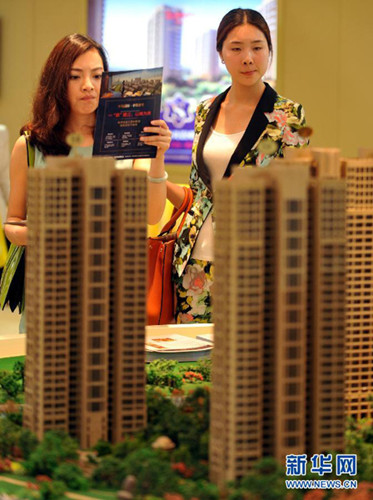
(Xinhua File Photo)
As China's real estate prices continue to rise despite the central government's repeated housing curbs, experts have suggested the cure is to be found in market-oriented measures.
China has been fine-tuning its property regulations since 2003, but average housing prices nationwide have more than tripled over the last decade, with some areas seeing prices grow by 10 times the original price.
The government's latest move to rein in the price was to release a guideline in early March urging local authorities to implement measures including a 20-percent tax on capital gains from property sales. That triggered widespread panic among potential buyers and sellers and created a secondhand property-purchasing spree in many cities.
In March 2013 alone, more than 40,000 pre-owned homes were sold in Beijing, up 300 percent from February. Meanwhile, the average sales prices rose more than 2 percent from February, official data showed.
Official statistics in April 2013 were not promising either. Sixty-seven of 70 sampled Chinese cities saw home prices increase from a month earlier, with home prices in Shanghai, Guangzhou and Shenzhen increasing 2.0, 2.1 and 1.8 percent, respectively.
A study published in late April by the Chinese Academy of Social Sciences (CASS) warned that China's real estate sector is already out of balance. The government needs to carry out changes and enforce curbs on the market, the authors said, otherwise, "there could be an overall loss in control of property prices."
"Demand outstripping supply is the key reason for the price hike," said Li Enping, a research fellow with the Institute for Urban and Environmental Studies at CASS.
"If the 20-percent profit-gain tax is strictly implemented, housing prices will rise faster because the tax will supress supply. On the one hand, the new tax will add a burden to homebuyers. On the other, people who can no longer afford a second hand home will turn to newly built homes, pushing up prices of the latter," said Li.
In addition, the central government's efforts to cool China's red-hot property market are undermined by municipal authorities, who lack the resolve to cool the market because proceeds from land sales contribute a significant part of their fiscal revenue and GDP growth.
A property tax plus regulatory measures has been touted as a viable solution to high prices and the tax alone has especially come to be viewed as a measure to restrict the buying of homes for investment purposes.
China's property tax pilot was initiated in January 2011 in Shanghai and Chongqing municipalities.
Shanghai has taxed housing purchases since Jan. 28, 2011, with rates of 0.4 percent and 0.6 percent, while giving an exemption of 60 square meters per capita for every registered household.
The property tax in Chongqing is levied on homes purchased both before and after the pilot scheme was brought in there, at rates of 0.5 and 1.2 percent. The Chongqing property tax especially targets luxury home purchases.
The tax was effective in curbing real estate speculation in the two cities and both have raised the tax threshold this year as housing prices elsewhere mostly keep edging higher.
China Securities Journal reported on Monday that the government's work agenda for this year includes nominating more cities to pilot property tax trials.
Liao Yingmin, a researcher at the Development Research Center of the State Council, noted that the expansion of the property tax trials is a long-term boon for China's real estate market, as he expects administrative regulations to weaken in their wake.
"Property tax provides the right path to force speculators to sell spare houses, narrow the yawning income gap and it will partly ease the fiscal burden of local government by providing tax income," Liao said.
But property tax is not a panacea to cure China's property market woes overnight, and it needs the joint efforts of various sectors including finance, taxation, land and housing, warned Liu Hongyu, deputy director of the School of Civil Engineering from Tsinghua University.

Copyright ©1999-2011 Chinanews.com. All rights reserved.
Reproduction in whole or in part without permission is prohibited.